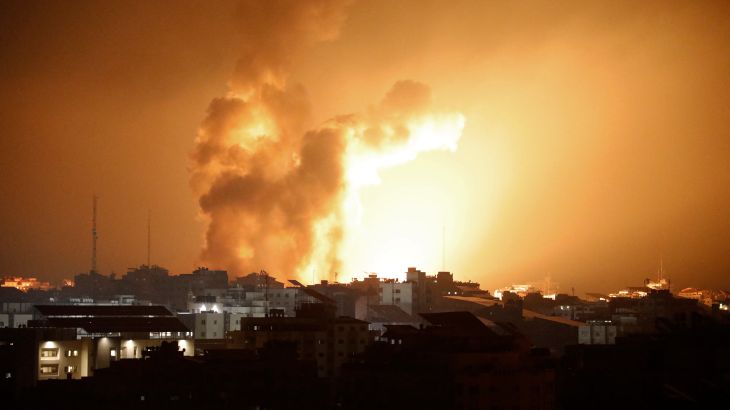Israel’s Strong Response to Hamas Attack Promises to Reshape the Middle East

Israel’s Strong Response to Hamas Attack Promises to Reshape the Middle East
In a bold and resolute statement, Israeli Prime Minister Benjamin Netanyahu has declared that Israel’s response to the recent barrage of rocket attacks by Hamas terrorists from the Gaza Strip will have profound and far-reaching implications for the entire Middle East region. As the conflict escalates, the Israeli leader’s words underscore the gravity of the situation and the determination of his government to protect its citizens.
The ongoing conflict between Israel and Hamas has entered a critical phase, with both sides exchanging fire and suffering heavy casualties. The conflict has resulted in over 700 deaths in Israel, including civilians and military personnel, and has caused widespread destruction in Gaza. As tensions continue to mount, the world watches with bated breath, aware that the repercussions of this conflict could extend far beyond the borders of the immediate combat zone.
Prime Minister Netanyahu made his statement during a meeting with mayors of southern border towns, which have borne the brunt of the recent rocket attacks. His words suggest that Israel’s approach to dealing with Hamas and the broader regional dynamics may undergo a significant transformation. To better understand the implications of Netanyahu’s statement, it is crucial to delve into the complexities of the situation and the historical context that has led to this moment.
The Root of the Conflict
The conflict between Israel and Hamas has deep historical roots, dating back decades. At its core, it revolves around issues of territory, sovereignty, and security. Hamas, which governs the Gaza Strip, has long been regarded as a terrorist organization by Israel and much of the international community. Its refusal to recognize Israel’s right to exist and its ongoing rocket attacks have perpetuated a cycle of violence and retaliation.
Israel, on the other hand, views its actions as essential for protecting its citizens from the constant threat of rocket attacks. The country’s security concerns are compounded by the fact that it is one of the world’s most densely populated areas, making it particularly vulnerable to rocket fire. This has led to a series of military operations aimed at dismantling Hamas’s infrastructure and deterring further attacks.

Netanyahu’s Bold Assertion
Prime Minister Netanyahu’s statement that Israel’s response to Hamas will “change the Middle East” carries significant weight. It suggests that Israel is prepared to take decisive action to not only safeguard its security but also reshape the regional landscape. This statement is a clear departure from the previous status quo, which often saw Israel reacting to provocations without altering the broader dynamics of the Israeli-Palestinian conflict.
One possible interpretation of Netanyahu’s assertion is that Israel is seeking to weaken Hamas to the point where it no longer poses a significant threat. This could involve not only targeting Hamas’s military capabilities but also attempting to undermine its political influence. By doing so, Israel may hope to pave the way for a more stable and peaceful resolution to the Israeli-Palestinian conflict.
International Concerns and Responses
The international community has been closely monitoring the situation in the Middle East, expressing deep concern over the escalating violence and loss of life. Diplomatic efforts have been underway to broker a ceasefire and bring an end to the hostilities. However, achieving a lasting peace in the region has proven elusive for decades, and the current crisis underscores the complexities involved.
World leaders, including those from the United States, the European Union, and the United Nations, have called for an immediate cessation of hostilities and a return to the negotiating table. They have emphasized the need for a two-state solution that would see the establishment of a viable Palestinian state alongside Israel, with mutually agreed-upon borders and security arrangements.
The United States, traditionally a staunch ally of Israel, has been actively engaged in diplomatic efforts to de-escalate the situation. President Joe Biden and his administration have emphasized their commitment to Israel’s security while also urging restraint and a peaceful resolution to the conflict.

Potential Ramifications
Netanyahu’s statement carries the potential for both positive and negative outcomes. On the positive side, if Israel’s response to Hamas results in a weakening of the organization and a renewed commitment to negotiations, it could be a significant step toward a more stable Middle East. A peaceful resolution to the Israeli-Palestinian conflict could have ripple effects throughout the region, fostering greater stability and cooperation.
However, there are also risks associated with Israel’s approach. An escalation of the conflict, with a high number of civilian casualties in Gaza, could lead to international condemnation and further strain Israel’s relations with the global community. Additionally, any efforts to weaken Hamas politically may be met with resistance from Palestinian factions and could further complicate peace negotiations.
Conclusion
The situation in the Middle East remains fluid and fraught with complexities. Prime Minister Benjamin Netanyahu’s assertion that Israel’s response to Hamas will “change the Middle East” underscores the high stakes and potential for significant regional repercussions. While the immediate priority is to halt the violence and protect civilian lives, the long-term challenge is to find a path to a lasting and just resolution of the Israeli-Palestinian conflict.

The international community, including the United States and the United Nations, continues to play a pivotal role in mediating a ceasefire and promoting a return to negotiations. The world watches with hope and trepidation, acutely aware that the choices made in the coming days and weeks will shape the future of the Middle East and determine whether lasting peace is attainable in a region scarred by decades of conflict.




